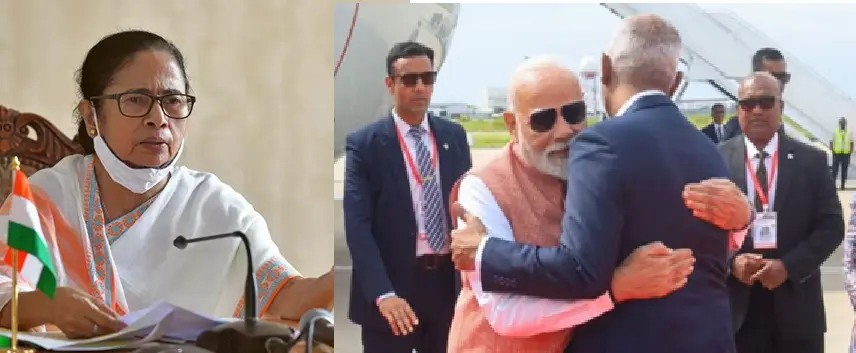
Religion Jibe From Mamata Banerjee Sends Shockwaves Through Parliament
In a fiery speech delivered at the Bhasha Andolan rally in Bolpur, West Bengal Chief Minister Mamata Banerjee took a direct swipe at Prime Minister Narendra Modi, questioning the optics and priorities of his recent diplomatic engagement with Maldivian President Mohamed Muizzu. Her rhetorical question, “Did you ask his religion first?”, has stirred a fresh political storm, highlighting the deepening rift between the Trinamool Congress (TMC) and the Bharatiya Janata Party (BJP).
The Hug That Sparked a Storm
During his recent visit to the Maldives, PM Modi embraced President Muizzu as part of a diplomatic gesture that coincided with the announcement of a ₹4,850 crore Line of Credit to support infrastructure development in the island nation. While the move was hailed by many as a reaffirmation of India’s commitment to regional cooperation, Mamata Banerjee saw it as a glaring contradiction.
Speaking at the rally, she asked:
“When you travel to Arab nations and hug the sheikhs, do you ask whether they are Hindus or Muslims? Did you ask the Maldives President his religion before hugging him and donating ₹5,000 crore, while depriving Bengal of its dues?”
The Funding Controversy
Banerjee’s criticism wasn’t limited to optics. She accused the central government of withholding funds meant for West Bengal, alleging that the Centre was prioritizing foreign aid over domestic obligations. According to her, the state has been denied its rightful share of central allocations, even as the government extends generous financial support to other countries.
This accusation taps into a long-standing grievance voiced by several non-BJP state governments, who claim that the Centre uses financial levers to punish political opponents and reward allies.
The NRC and Identity Politics
Banerjee’s remarks were part of a broader narrative she’s been building around Bengali identity and linguistic pride. At the same rally, she launched the Bhasha Andolan, a movement aimed at resisting what she calls “linguistic terror” and the backdoor implementation of the National Register of Citizens (NRC) in Bengal.
She alleged that Bengali-speaking migrants are being detained and tortured in BJP-ruled states, despite possessing valid identity documents. Referring to a recent incident in Maharashtra where a Bengali migrant laborer was reportedly killed, she said:
“This is not India. This is a big shame for us. I do not recognise the idea of a nation that butchers a migrant just for speaking Bengali.”
Electoral Roll Revision and Rohingya Allegations
Banerjee also criticized the Election Commission’s Special Intensive Revision (SIR) of electoral rolls, calling it a conspiracy to disenfranchise Bengali voters. She dismissed claims that Bengal harbors 1.5 crore Rohingyas, saying:
“You don’t know geography. There are only 9 lakh Rohingyas in Bangladesh.”
Her comments reflect growing concerns among opposition leaders that voter roll revisions and NRC-like exercises are being used to manipulate electoral demographics in favor of the BJP.
Political Strategy or Populist Rhetoric?
Banerjee’s remarks are part of a calculated political strategy aimed at mobilizing Bengali identity ahead of the 2026 West Bengal Assembly elections. By framing the issue as one of cultural survival and dignity, she seeks to rally support from migrant workers, linguistic minorities, and secular voters.
Her jibe at PM Modi’s hug with Muizzu is emblematic of her broader critique: that the BJP’s nationalism is selective and performative, and that its policies often marginalize communities that don’t fit its ideological mold.
BJP’s Response
While the BJP has not issued an official rebuttal to Banerjee’s latest remarks, party leaders have previously accused her of playing divisive politics and undermining national unity. They argue that her opposition to NRC and voter roll revisions is a cover for appeasement politics, and that her criticism of foreign aid reflects a lack of understanding of India’s strategic interests.
India-Maldives Relations: A Diplomatic Balancing Act
The ₹4,850 crore Line of Credit extended to the Maldives is part of India’s broader strategy to counter Chinese influence in the Indian Ocean region. The Maldives has been a key partner in India’s “Neighborhood First” policy, and the financial aid is aimed at strengthening bilateral ties and supporting infrastructure development.
Critics of Banerjee’s remarks argue that foreign diplomacy should not be conflated with domestic politics, and that India’s global commitments are essential for its strategic positioning.
The Role of Religion in Political Discourse
Banerjee’s question “Did you ask his religion first?”, is a provocative critique of what she perceives as the religion-based discrimination practiced by the BJP. By highlighting the inconsistency between Modi’s embrace of foreign Muslim leaders and the alleged mistreatment of Muslim and Bengali migrants within India, she seeks to expose what she calls the hypocrisy of Hindutva politics.
However, such remarks also risk polarizing public opinion, especially in a country where religion and politics are deeply intertwined.
Stay updated with the latest news on Rapido Updates. Keep yourself updated with The World, India News, Entertainment, Market, Automobile, Gadgets, Sports, and many more